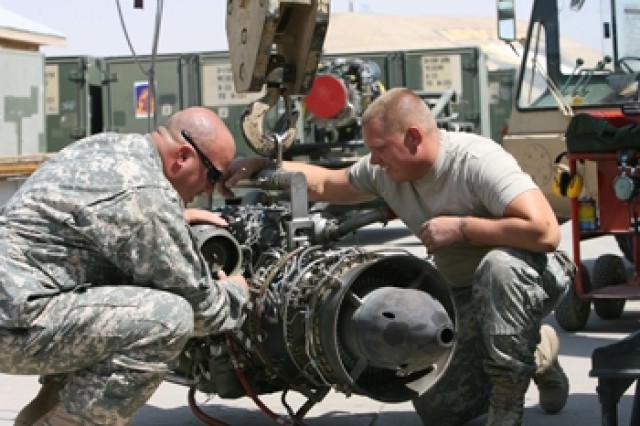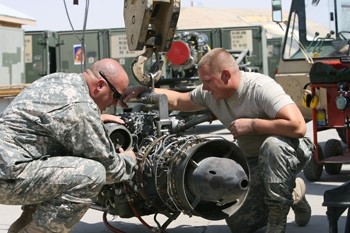
components of UH-60 Black Hawk helicopter at Logistics Support Area Anaconda, Iraq. Searcy and Davis are part
of a young platoon of Soldiers force... VIEW ORIGINAL
BALAD, Iraq (Sept. 18 2007) -- According to Sgt. 1st Class Gregory Searcy, years ago, when his father pinned on E-7 with only 16 years in the Army, he was considered young to be joining the ranks of senior non-commissioned officers.
Last month, when Searcy himself joined those ranks with only 12 years of service, not many people considered it out of the ordinary. In today's Army, many Soldiers are moving through the ranks at an accelerated pace.
"The Army is getting younger," Searcy said.
He ought to know. He's the platoon sergeant for the 12th Combat Aviation Brigade's D Co. 3rd Battalion, 158th Aviation Regiment's maintenance platoon. Of the 23 Soldiers in his charge, only five have been in the military for at least three years.
Thirteen of them came to him straight out of training just six months before he was to have them ready to deploy to combat.
"I was very worried and skeptical coming out here," he said. "I knew what we were coming into, and what would be asked of us, and I wasn't sure we could handle it."
He wasn't the only one worried.
"I thought for sure they'd be the ones to drop the ball," said D Co. 1st Sgt. Ronald Pickens. "Instead they're the ones who've been picking it up. They handle all we give them and they want more. I've been super impressed with these guys."
The situation in D Co. is not that unusual. According to Pickens, recent graduates from four consecutive helicopter maintenance classes helped fill the ranks across the battalion. And as the Global War on Terrorism continues well into its fourth year, younger Soldiers across the Army are being asked to learn and do more than ever before.
"These guys have done more in two months here than they would have done in six months back in Germany," said Searcy. "By the time they leave Iraq, they're going to be where I was when I had three years in the Army. Right now, the Army is producing very experienced, technically knowledgeable Soldiers in a very short time."
Searcy and his first sergeant admit, though, that there are challenges... challenges far different from what they expected.
"Discipline-wise, I haven't had a problem," he said. "These guys don't have bad habits yet, so if they're getting out of line it'd be our fault as leaders. They only do what they see us do."
Their challenge is developing leaders. With so many Soldiers coming in at the same time, waivers for promotion are tight.
"All the Pfc's here were together from the start," said Pickens. "We have to be so selective on promotions because they all came up together."
"We look for guys that take initiative and want to learn," said Searcy. "They enroll in college, do great at (physical training), shoot expert (at the rifle range) and do all the stuff Soldiers are supposed to do."
Pfc. David Pliego from New Braunfels, Texas is one of those guys. He joined the Army because he wanted to be part of Army aviation. He's taking college classes, and is considering a career as a pilot.
"When I come to work every day, I'm with my friends," he said. "Everyday we have breakfast together. That allows us to hit the 'reset' button... after that we charge up, and we're ready to work."
"I think it's a blessing coming to Iraq with people I was in training with," said Pfc. Timothy Davis, another standout from Roanoke, Virginia. "I get to bounce what I learn off what other guys just like me are learning."
Though new to the Army, and on his first deployment, Davis plans to make it a career.
"I'm glad I deployed so soon," he said. "Having this experience will make me more credible as a leader when I do pin on some rank."
The D Co. maintenance platoon, like a growing number of platoons in today's Army, is full of youth and inexperience. But their leaders say that's not necessarily a bad thing.
"My maintenance platoon is my youngest from top to bottom," said Pickens. "And they present the least amount of problems."
"I hear people complain about this generation of kids all the time," he said. "I tell them 'you don't know these kids.' They joined the Army knowing exactly what they were getting into and they're doing great."

Social Sharing